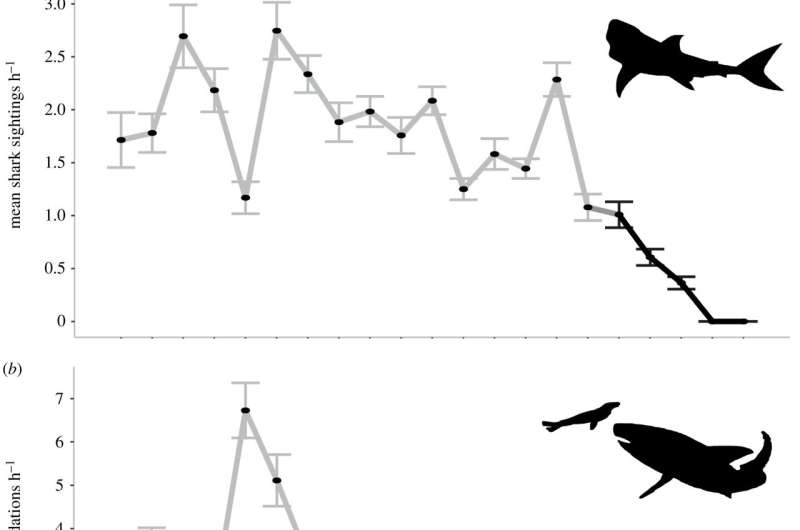Great whites have disappeared from South Africa’s False Bay

By RICK SOBEY | rick.sobey@bostonherald.com | Boston Herald
PUBLISHED: January 30, 2022
Cape Cod seals that are under constant threat from great white sharks during the summer and fall are likely very stressed out, according to new research.
Shark scientists have discovered that stress levels in seals have significantly dropped following the loss of great white sharks off of South Africa’s False Bay.
The Cape fur seals have also started drifting farther from the shore over deeper water, a behavior that would have previously made them susceptible to shark attacks.
The recent decline and then disappearance of great whites “provided an unparalleled opportunity to investigate the consequences of losing an apex predator on the behavior and physiology of their prey, a scenario usually extremely difficult to study in the wild,” said Neil Hammerschlag, director of the Shark Research and Conservation Program at the University of Miami.
The research team has been collecting seal poop samples from the seal colony in South Africa’s False Bay, and measured the hormones levels in their feces. The seal stress levels plummeted following the loss of great whites from the region.
“To our amazement, stress hormone levels measured in the seal feces were more than four times lower on average in the absence of great whites,” Hammerschlag said.
“We also observed behavioral changes in the seals,” he added. “Seals are now rafting farther from shore over deeper water, a behavior that would have certainly put the seals at risk of shark attack if any were still around.”
False Bay in South Africa has been a famous hotspot for great white sharks, as they’ve patrolled the waters to hunt for seals.
Great whites over the last couple of decades have been seen launching more than 40 attacks a day on seals. Sharks have been observed jumping out of the water and snatching seals.
Researchers wanted to know if the predation risk from great whites was influencing seal’s stress levels, so they started collecting seal feces off the island’s rocks. The results revealed that the seals were experiencing high levels of stress from the risk of shark attacks — quadruple the levels of seals on islands that are not exposed to such a high shark attack risk.
Then when the apex predators disappeared, the research team had the sudden opportunity to test the impact of sharks leaving the area.
The researchers said this study is the first recorded evidence in the wild of physiological changes in prey due to the loss of an apex predator.
Changes measured in prey behavior during loss of apex predators

A team of researchers has documented the changes that occurred to a type of prey (cape fur seals) when their predator (great white sharks) disappeared from their environment. In their paper published in the journal Biology Letters, the group describes their study of the seals both before and after the sharks left the environment.
As the researchers note, much research has been conducted regarding the impact on prey when new predators enter an environment, but few efforts have sought to learn more about the opposite scenario. In this new effort, the researchers found a unique opportunity to learn more about what happens to prey in general when a predator departs—for whatever reasons—when great white sharks began disappearing from the shores of South Africa.
Prior research has shown that approximately 1.5 to 2 million cape fur seals live along South Africa's coasts and nearby islands. Research has also shown that the only predator of cape fur seals has been great white sharks because the seals are too large to be bothered by other meat-eating ocean dwellers. Ocean scientists in the area began to notice declines in the number of great white sharks living in the area in 2015 and since that time, they have disappeared from the area entirely, though it is still not clear why. With the disappearance of the sharks, the researchers found themselves with a golden opportunity to learn more about what happens to prey when their predator is removed from the scene.
The work by the team first involved simply watching the seals as they went about their normal lives to see if they could spot any behavioral changes. They found that the seals began venturing farther out to sea and rafting over deeper waters—activities that would have previously put them at an increased risk of an attack.
The researchers also began comparing seal scat samples gathered from beaches from the time before the sharks disappeared to after. The scat contains traces of fecal glucocorticoid concentrations, which can be used to measure stress levels. Researchers found that the stress levels of the seals were greatly reduced after the sharks disappeared.Stress test: New study finds seals are stressed-out by sharks
More information: Neil Hammerschlag et al, Loss of an apex predator in the wild induces physiological and behavioural changes in prey, Biology Letters (2022). DOI: 10.1098/rsbl.2021.0476
Journal information: Biology Letters
© 2022 Science X Network
No comments:
Post a Comment